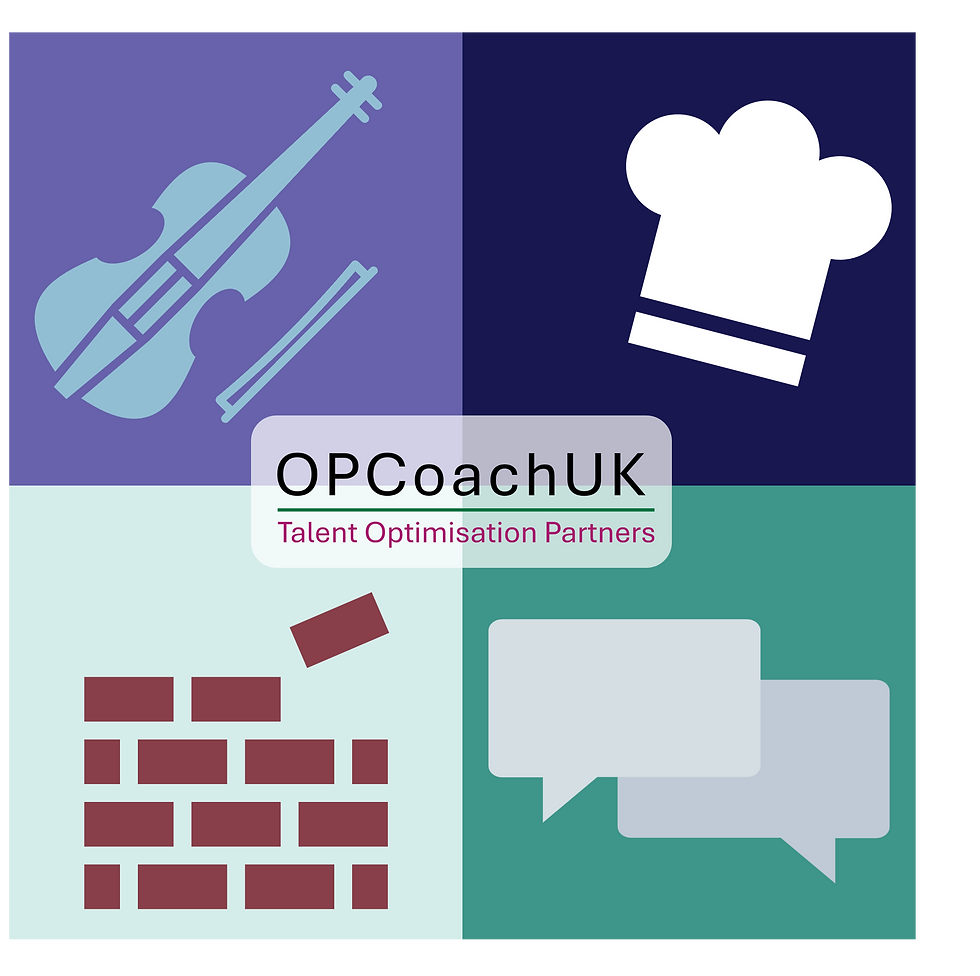Running on fumes? The answer can be surprising.
- Heather Bingham
- Nov 3, 2025
- 4 min read

We’re now on the exhausted sprint to the end of 2025. It hasn’t been the best of years, has it? If your business has smashed it, give yourself a pat on the back that knocks you off your feet. For everyone else — let’s just hope 2026 brings a lift.
At OPCoachUK, much of our work is about helping people handle the rough as well as the smooth. Most of that happens in a work context: developing behaviours and attitudes that build resilience and performance. But this piece is about something else — the things we do outside work that strengthen our careers.
In coaching and mentoring, we often deal with what’s right in front of people: stress, stagnation, or the one stubborn part of a role that refuses to shift. Occasionally, we look further ahead, mapping the near future or even the long term.
This time, though, I want to talk about how we set up our whole lives for career success. And no, it’s not about another qualification. It’s about how we use our minds beyond work — building the kind of depth and stamina that make growth sustainable.
There are a few things worth serious thought that aren’t the usual “lose weight, practise mindfulness, go somewhere enviable on holiday” variety. This is about how we fine-tune our ability to handle whatever’s thrown at us — by keeping our brains in the best possible condition.
1. Introversion and Extraversion
The first idea comes from MBTI (Myers-Briggs Type Indicator) and concerns whether we’re naturally extraverted or introverted. I don’t see this as a social label. While those of us who are “very I” might be perfectly happy as lighthouse keepers — as long as there’s plenty to do—it’s not really about liking or avoiding people. It’s about energy.
If you have a preference for extraversion, you gain energy from being with others and lose it when alone. If you lean towards introversion, it’s the reverse. That means if you prefer your own company, almost any job will take a bit more energy. So make sure you have ways to recharge. Even if it’s a case of “Daddy’s having his alone time”, any teasing will be outweighed by the benefits of being more energised the rest of the time. And no, sleeping doesn’t count as alone time.
2. Learning and Mental Space
The next one draws on CliftonStrengths and the theme of Learner. When we take on something new — a product, a responsibility, an entire role — all that information first lands in our working memory. Picture that as the pile of post on your kitchen table: everything stuffed in together, some vital, some trivial, creating a constant mental jumble. Once sorted, those pieces filter down into long-term memory.
Your long-term memory is a marvel — perhaps you imagine it as a data centre with neatly labelled servers, or as a vast constellation of linked facts. Either way, retrieval is easy once information is stored properly. But when your working memory is crammed and unsorted, it becomes like a rush-hour carriage on the Central Line.
The key is not to force facts in, GCSE-style. Our brains already have too much to juggle. What we need instead is a proper mental distraction — and that isn’t passive screen time. We need something that engages the brain differently. A huge proportion of people have “Learner” as one of their CliftonStrengths themes: they find energy and enjoyment in learning itself. Yet even if you don’t, the cognitive benefit is universal.
The trick is to learn something — anything — that interests or serves you. I use Duolingo for Italian, German and even chess. If you’re going on holiday, learn the language. Need a household repair? Learn to do it well enough yourself. Bored of the same meals? Learn a new cuisine.
Think of it as having two carriages. One is jammed full of work matters; the other holds your hobby, language or project. When you turn your attention to the second, the first has space to clear and reset before you return.
3. Doing Something You’re Good At
The last one is about finding something engaging that you do well. For tough times, you don’t want all your self-worth in one basket. If everything rests on work, a setback can feel devastating.
What counts as “something you’re good at” is broad. It might be a skill, like playing the violin — that’s my own balancing act — but I’ve seen it in people who “do family” brilliantly, or who just keep improving at a hobby. It doesn’t have to be lifelong; it can change every six months. The point is to have something that gives you competence, enjoyment and identity beyond your job.
When you build these elements of balance into your life, your resilience and capacity for professional growth expand naturally. None of this should feel like a chore — it’s more of a reshuffle. The aim is a solid sense of self: one that can’t be easily knocked by a bruising meeting or a slow-to-develop skill.
✴️ And if 2025 has left you a little dented, that’s fine. The right kind of “outside work” might be the very thing that makes 2026 your year of recovery and recalibration.
✴️ So, before you plan your next goal, ask yourself instead: how’s your brain doing? And what are you feeding it outside work?









Comments